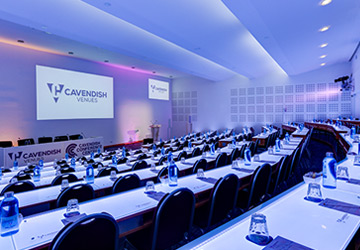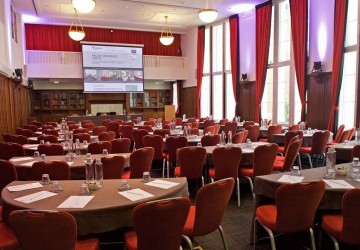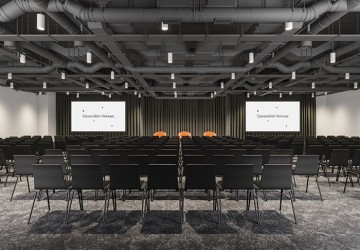London – one of the most sustainable places on the planet – Cavendish Conference Venues place in the jigsaw
We were told as youngsters to judge others by what they do, not what they say. So it is with greens.
If this week’s Danish hot-air balloon trip for the leisured classes was serious, it would be conducted by grown-ups through diplomacy and the internet.
Instead it is one more United Nations poverty summit with a phoney deadline, a high-flying, high-spending, all-feasting, all-pledging jamboree, unchanged in style since the 19th-century Congress of Vienna.
Meanwhile, back in London, citizens are quietly honouring ecology’s dirty secret, not a word of which is breathed in Copenhagen.
It is that the best way to conserve energy on the planet is to live in a big city, preferably a very big one.
I cannot quarrel with the overwhelming opinion of honest scientists that the Earth is warming, though it would help if they could resolve their disagreement with other, no less honest, scientists.
The world is clearly warming and humankind does not help by tipping quantities of harmful gases into the sky.
Where laymen can disagree is over what to do about it, and especially over what the private citizen can do, rather than just watch politicians enjoy themselves doing nothing, or doing the wrong thing.
One answer is given in a new book by the American urbanologist, David Owen, called Green Metropolis. His message is simple.
We should use more intensively the land area that is already built over, and not spread new settlement across virgin acres of carbon-rich countryside, wherever they may be.
New settlements, however many times you prefix them with “eco-“, are all carbon belchers. They are low density and require high mobility to service them.
Most people think of cities as ecological disaster areas, seething swamps of concrete and tarmac, fuming traffic and throbbing central heating.
Greens are seen as inhabiting a virtuous Hobbit-state of woodland cottages, where people dig potatoes, sing folksongs and cycle everywhere, except to Copenhagen.
To Owen it is cities that are the ecological paradise, especially his home in New York, a place “of extreme compactness, the greenest community in the United States“.
The residents of Manhattan get about it with 10 times the energy efficiency of average Americans. When Owen and his wife moved (briefly) to the country, they found their electricity consumption went up eight times, they had to buy a car and drove 30,000 miles a year on ordinary household trips.
Londoners are much like New Yorkers. They use space intensively and energy efficiently.
They mostly occupy long-constructed buildings, sharing walls, roofs, ceilings and heating systems with others.
They also share transport, street lights and entertainment. They walk, cycle or use public transport (mostly electric) to get to work or play.
Londoners crowd roads, shops, restaurants, theatres, pubs. They communicate with each other without having to take long journeys.
They do not heat, light and cook in isolated homesteads, where almost every journey requires the carbon emissions of an internal combustion engine.
Such behaviour does, of course, depend on how each individual uses the city, and travels from it.
In a recent Times audit of “typical” carbon use, the one activity that wrecked every family’s record was flying or driving long distances for work or holidays. The really green Londoner finds ever more original ways of staying in London.
The city’s greatest carbon “sink” is the stock of buildings, houses, flats, schools, shops and offices that have been used and re-used, often over centuries.
Victorian property can require no more than a patch of plaster and a lick of paint, a new top floor or a side extension, to be readied for another use and another century.
If re-using existing structures is good, then tearing them down and rebuilding them is bad. It eats energy.
Rebuilding in the form of energy-guzzling steel and glass boxes and towers, usually unadaptable for later re-use, is particularly crazy. London must learn to conserve itself in every sense.
Government planning policy is to encourage new building in the green belt and countryside. This is anti-green lunacy.
The tax system also discourages urban conservation by imposing VAT on repairs, yet relieves VAT on new building.
How can Gordon Brown lecture the world – as he did yesterday – that “our children will not forgive us” for increasing emissions when he encourages carbon extravagance in this way?
The same goes for the other shocker, the internal combustion exhaust. Londoners generate less than any other Britons, for the simple reason that they are intensive users of public transport.
No one can do much to reduce London’s traffic, as people will stop using the city if vehicles cannot move about with reasonable convenience.
But traffic managers are still committed to making car journeys longer and slower, with proliferating traffic lights and one-way systems, generating millions of tons of unnecessary emissions. They are still in the dark ages.
To add insult to this injury, the Government’s green minister, Ed Miliband, is inexplicably campaigning for a third runway at Heathrow.
Such policies are not the fault of London’s citizens, who are its victims. They are the fault of London’s rulers.
They are the fault of those painting themselves green and cavorting through the streets of Copenhagen.
It is the mass of humanity trudging over London Bridge and quietly going about its daily business that deserves the greenest halo.
In our microenvironment we at Cavendish Conference Venues feel we are doing our sustainable bit, reusing buildings, taking hard to let spaces, deliberately locating our sites as near to our clients as possible, this and a myriad of other measures has helped us win the recent Visit Britain sustainable venue of the year award.
Bookings & Enquiries
Whether you need help planning your event, have a question about one of our venues or want to make a booking, our friendly Venues Team are here to help.
+44 (0)20 7706 7700
Why Cavendish?
At Cavendish Venues we are committed to exceeding your expectations, and with over 93% repeat business we know we're doing something right!



